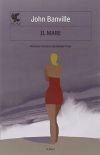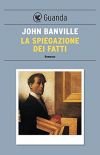
Il mare è un romanzo di John Banville del 2005 vincitore del Booker Prize. La vicenda è narrata da Max Morden, uno storico dell'arte in pensione che cerca di accettare le morti di coloro che ha amato da bambino e da adulto.

The Untouchable is a 1997 novel by the Irish writer John Banville. The book is written as a roman à clef, presented from the point of view of the art historian, double agent and homosexual Victor Maskell—a character based largely on Cambridge spy Anthony Blunt and in part on Irish poet Louis MacNeice. The character of …

Eclipse is a novel by the Irish writer John Banville, though its intensely lyrical style and unorthodox structure have prompted some to describe it as more prose poem than novel. Along with the novels Shroud and Ancient Light, it comprises a trilogy concerning an actor Alexander Cleave and his estranged daughter Cass.

Shroud is a 2002 novel by John Banville. It is part of the Alexander and Cass Cleave Trilogy along with the novels Eclipse, published in 2000, and Ancient Light, published in 2012.

Doctor Copernicus is a novel by John Banville, first published in 1976. "A richly textured tale" about Nicolaus Copernicus, it won that year's James Tait Black Memorial Prize. Doctor Copernicus contains four sections. The first two focus on the subject's life up until about the age of 36, while the fourth focuses on …

Kepler is a novel by John Banville, first published in 1981. In Kepler Banville recreates Prague despite never having been there when he wrote it. A historical novel, it won the 1981 Guardian Fiction Prize.

Athena is a novel by John Banville. In it a woman steps out of her lover's canvasses. It contains a character called Morrow. There is murder, art and Greek mythology. There is also a serial killer. Reviewers compared it favourably with the writing of John Fowles, William Gass, John Hawkes and Vladimir Nabokov.

Ghosts is a novel by Irish writer John Banville. Published in 1993, it was his first novel since The Book of Evidence, which was shortlisted for the Booker Prize. The second in what Banville described as a "triptych", to make "an investigation of the way in which the imagination works." This novel features many of the …

 English
English Español
Español Deutsch
Deutsch

